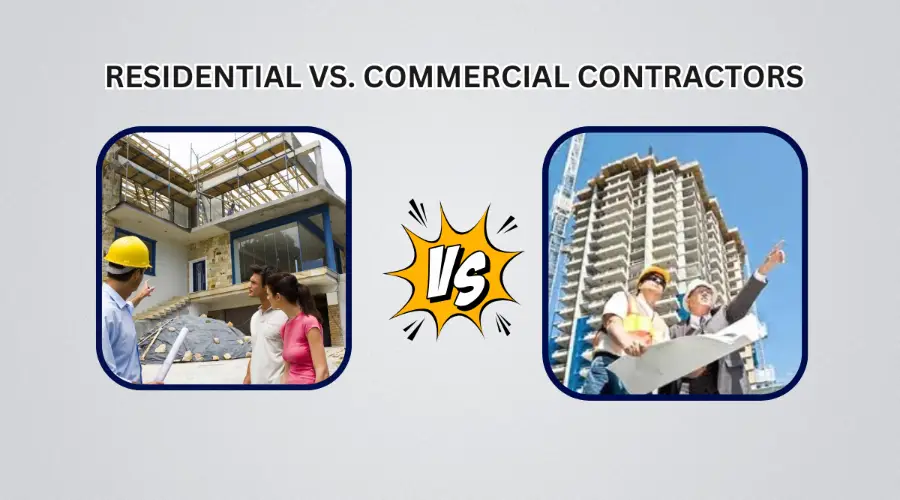When planning to construct a new home or renovate an existing building, selecting the right contractor is crucial for ensuring the work quality. The quality of work can be ensured by hiring a contractor with proficient knowledge about building plans and home improvement.
A contractor is a pillar of construction whose intention is clear about providing a successful outcome. They can be a person or company, but they should take responsibility to support and streamline the overall project.
In this article, you’ll learn the specific role of contractors in construction projects and how to choose the right one that fits your needs.
What are Residential Contractors?
A residential contractor is a person or entity that works on a residential construction project. They are involved in building, remodeling, or repairing homes and smaller residential structures, catering to the specific requirements of their clients. This relationship typically involves a direct and independent interaction with each client, ensuring an ongoing workforce dedicated to the project.
They will take complete responsibility for hiring and supervising the project from start to completion. Your contractor is the only person involved in all aspects of work, from building the plan to cost estimation.
How to Choose the Right Residential Contractor?
The contractor should be evaluated in different aspects to ensure that your project will be completed as you have planned. Here are some checklists provided to consider when choosing a residential contractor:
Meet Multiple Heads: It is better to meet at least three to four contractors and get estimates from them. When comparing the estimates with one another, you have an idea about your project. Look at the work methods, timeline, cost estimation, building materials, and other factors they have mentioned. Be cautious about significant variations that can be too high or low.
Prefer Local Contractors: Local contractors are generally easier to contact, and you may have a chance to visit their previously worked projects in the nearby area. If they are not ready to give their local or physical address, be aware of their legitimacy and intention.
Inquire about Their Past Work: Just by using word of communication, you can’t conclude that they will provide you with a high-quality of work. Check references about their customer service, quality of products, workers, and other significant factors. By inquiring about their previous work, you can predict their overall reputation and years of business experience. It is advisable to choose a contractor with more than 5 years of field experience.
Ensure Their Insurance and Bonding: Confirm that the contractor is legally insured and bonded. Ask them to provide the COI (certificate of insurance) and call the company directly to verify the coverage and policy are still in effect. If contractors are not legally insured, homeowners could be held responsible for any accidents that occur on their property.
Get Your Deal in Writing: Prepare a contract before the work begins. It should include a detailed description, such as the start date, completion date, cost, payment schedule, and other significant information. Consider consulting a lawyer for legal authentication, which can provide support during times of disputes or obstacles.
What is the Role of a Residential Contractor?
Building or renovating a home is quite a sensitive job for homeowners. Seeking assistance from a reliable and reputed contractor can give you better results.
Their primary role is to take complete responsibility for the construction job, from planning to execution in a streamlined manner.
They should provide expertise and experienced labour in the field to ensure the best final outcome aligned with the owner’s expectations. Additionally, they need to evaluate whether the quality of work results in a better final outcome.
Common Residential Projects Handled by Contractors

Residential construction is lucrative right now, which means that the contractor should keep their perspective forward and avoid creating poor results on the projects. They commonly handle the projects like:
Single Family Homes: These are standalone structures located mostly outside of the cities. It can be planned according to the owner’s expectations rather than bothering the neighbors. A single-family home includes small yards, required rooms, and green spaces but often requires extensive maintenance.
Townhouses: It is a combination of condos and single-family homes. They offer enough privacy and comfort with less maintenance. The cost of townhouses is generally more affordable than single-family homes with some pretty useful amenities.
Multi-Family Homes: Constructing multi-family homes is rare. If the contractor gets a request to build multi-famile homes, they will plan according to the client’s demand. These constructions are mostly used for rental purposes, whereas the owners maintain them as an investment.
Condominiums: Condos, or condominiums, are mostly found in smaller towns and cities. Many homeowners prefer purchasing one of these residential constructions with pools, gyms, lounge areas, and other amenities. The homeowners will charge the maintenance cost for all these amenities, yet it is not higher than single-family homes.
Residential Vs. Commercial Contractors

| Feature | Residential Contractors | Commercial Contractors |
| Project Scale | They handle smaller-scale projects like single-family homes, condos, and small apartment buildings. | Unlike residential contractors, they work on large-scale projects like shopping malls, industrial complexes, and office buildings. |
| Client Relationship | Contractors need to deal directly with individual homeowners from planning to construction. | They have more professional and formal relationships with organisations and businesses. |
| Complexity | Residential homes are less complex projects established with standardised regulations and building codes. | Commercial buildings are complex projects that have specialised building codes, safety standards, and zoning regulations. |
| Risk and Liability | Residential contractors are subjected to lower risk and liability. | Complex projects like high-rise buildings or commercial constructions typically have a higher risk and liability. |
Final Wordings
Homebuilding or improvement needs a qualified contractor to handle the projects efficiently. It may be small or large-scale construction; ensure they are reputed and capable enough to provide the best results. By considering certain key factors, you may be aware of low-level contractors who consider cost to be the prime thing. Make sure about their construction skill and knowledge before signing a contract with them.
FAQs
You can ask your contractor for their certificate of insurance (COI), which includes the name of the insurance company, policy limits, and policy number. With this information, you can directly contact the company and ensure the contractor’s policy is still in effect.
Before beginning the construction work, the homeowners are advised to sign a contract. If you are unsatisfied with their work, you can file a complaint against them and take legal action.

